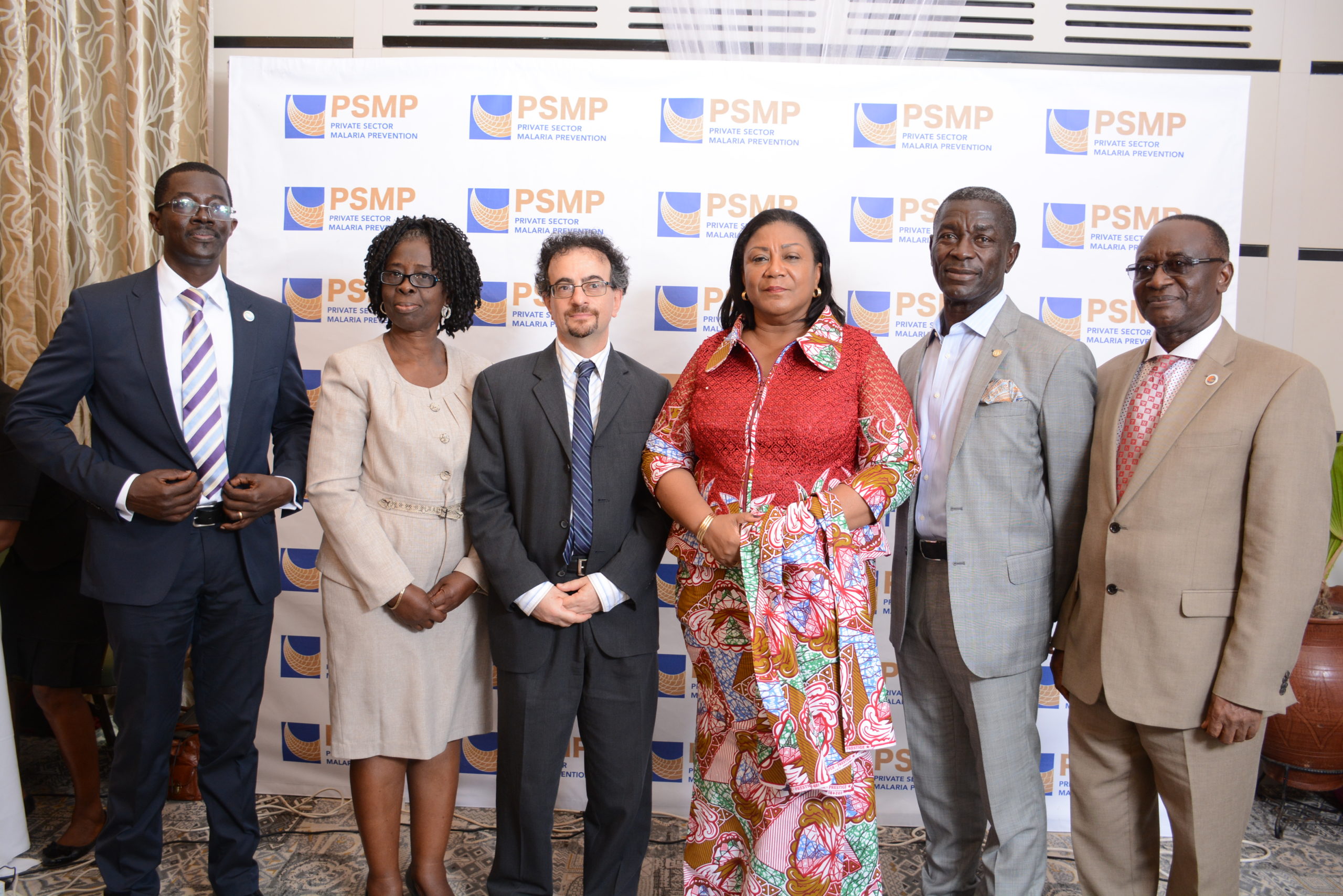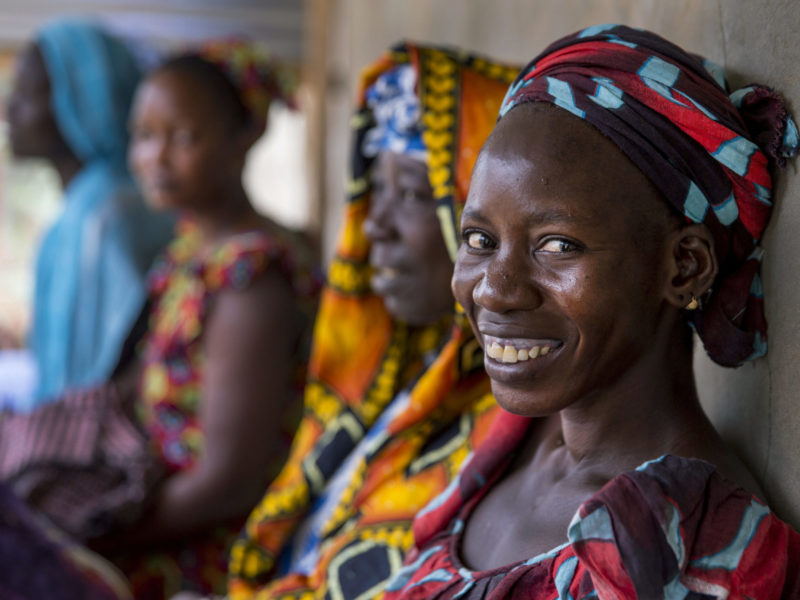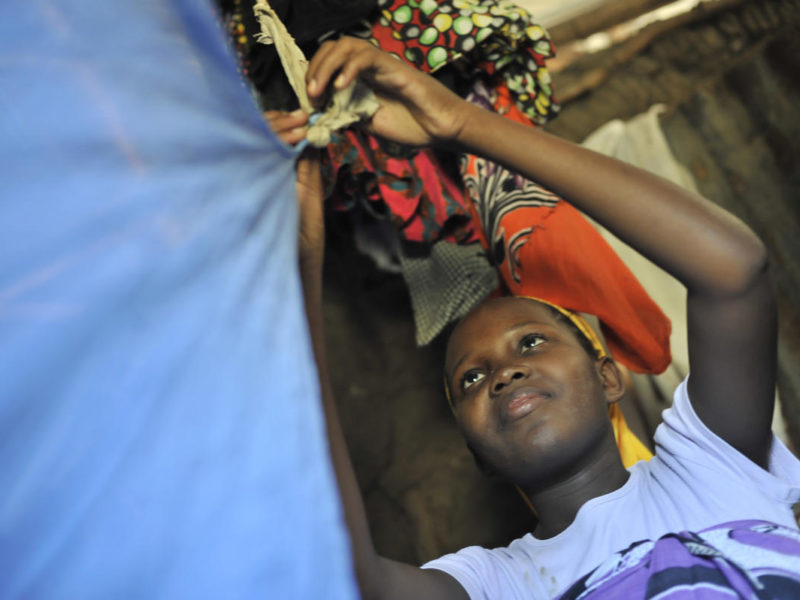Gathering highly engaged political, business and health sector leaders to support malaria prevention is no small task, but neither is freeing a country of this disease and its devastating effects on lives and economies. It is for precisely this reason that the Johns Hopkins Center for Communication Programs-led Private Sector Malaria Prevention (PSMP) launched “Malaria Safe,” a workplace initiative to help businesses and their surrounding communities become malaria-free.
Her Excellency Mrs. Rebecca Akufo-Addo, First Lady of the Republic of Ghana, officially launched the Malaria Safe initiative on February 22, 2017 in Accra, Ghana under the theme “Fighting Malaria for the Economic Prosperity of Ghana.” In attendance were approximately 65 representatives from the private sector, government and the donor and non-governmental sector.
With funding from the UK Department for International Development, PSMP is a three-year pilot program that seeks to boost private sector involvement in malaria prevention. To that end, PSMP is:
- working with long-lasting insecticide-treated net (ITN) manufacturers, distributors and retailers to help expand the commercial sector’s ability to sell ITNs in retail markets and
- partnering with companies to increase investments in workplace programs that protect workers and communities from malaria.
The Malaria Safe workplace program specifically supports employers by facilitating cost-effective ITN distribution plans, while providing workplace malaria education sessions for company staff and community members and raising the profile of champions and successes through advocacy.
“Today, as we progress toward economic growth and quality development, private sector participation in malaria prevention is a sure way to support government in sustaining health and therefore promoting wealth,” Her Excellency Mrs. Rebecca Akufo-Addo said. “The Ghanaian business sector must rise to the occasion, embrace the goals of the Ghana-UK Private Sector Malaria Prevention project and its Malaria Safe initiative. Effective enrollment in this partnership and application of the Malaria Safe pillars would go a long way in enabling the private sector, donors, civil society and government work towards a common vision of a malaria-free Ghana.”
The launch was timely, as a survey report in the Malaria Journal recently indicated that 93% of companies in the Accra, Ashanti and Western regions agreed businesses need to invest in this area. According to the report, among the 62 companies surveyed, malaria resulted in economic losses of US$6.58 million over two years (2012 to 2014) and nearly 4,000 work days due to absenteeism.
Malaria Safe encourages employers to take certain actions that can lead to a malaria-free future. These actions are categorized into four pillars: protection, education, visibility and championing. For instance, distributing ITNs and providing ITN education to employees and communities are key recommended actions in the protection and education pillars, while championing and raising visibility of malaria prevention efforts motivate people to use the nets and inspire other institutions to invest as well. A Malaria Safe Guide was developed based on the best practices, resources and experiences of companies that have been committed to the fight against malaria in Ghana and across endemic Sub-Saharan Africa.
“Companies that partner with the PSMP project and adopt the Malaria Safe pillars will be taking strides to protect their employees and communities from malaria, which is important because malaria has far-reaching effects on business and the economy,” said Felix Nyanor-Fosu, PSMP Chief of Party, adding that, “when public sector programs and private companies invest in malaria prevention for their workers and communities, they see marked decreases in malaria cases, lost work days and subsequent increases in profits or benefits to the local economy.”
The Honourable First Lady joined business leader Prince Kofi Amoabeng, British High Commissioner of Ghana Jon Benjamin, the Ghana Health Services and others, in providing remarks during the launch in support of the Malaria Safe initiative. Business leaders from a fair trade banana farming company, a rubber manufacturing company and the Ghana Revenue Authority, also provided remarks in support of the Malaria Safe initiative and their business need to invest in malaria prevention.
During the event, companies filled out Expressions of Interest forms for follow up on key Malaria Safe activities, such as buying ITNs.
Ending the event with a call to action, His Excellency Jon Benjamin said, “We need your commitment and leadership to help ensure that people in your workplace and in your families receive nets, immediately and consistently use them the way they should.”
The ultimate goal of the PSMP program is to enable a self-sustaining private sector committed to malaria prevention, with the expectation that donor interventions will decrease over time, given Ghana’s World Bank status as a lower-middle income country.
For more information on the PSMP and Malaria Safe, go to the PSMP website at www.privatesectormalaria.org.
This post was written by Kathryn Bertram, Sr. Program Officer. Kathryn is based at CCP’s headquarters office in Baltimore, MD and supports projects in Ghana and Sierra Leone.





